Party of Italian Communists
Party of Italian Communists Partito dei Comunisti Italiani | |
|---|---|
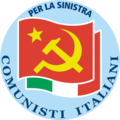 | |
| Leaders |
Armando Cossutta Oliviero Diliberto Cesare Procaccini |
| Founder | Armando Cossutta |
| Founded | 11 October 1998 |
| Dissolved | 11 December 2014 |
| Split from | Communist Refoundation Party |
| Succeeded by | Communist Party of Italy |
| Headquarters |
p.za Augusto Imperatore, 32 00186 Rome |
| Newspaper | La Rinascita della Sinistra |
| Youth wing | Federation of Italian Communist Youth |
| Membership (2012) | 12,500[1] |
| Ideology | Communism |
| Political position | Left-wing |
| European affiliation | Party of the European Left |
| International affiliation | none |
| European Parliament group | European United Left–Nordic Green Left |
The Party of Italian Communists (Italian: Partito dei Comunisti Italiani, PdCI) was a communist party in Italy.
History
Foundation and early years
The PdCI was founded in October 1998 as a split from the Communist Refoundation Party (PRC) by Armando Cossutta, the original leader of the PRC.[2] The main reason for the split was the unwillingness of the majority the Communist Refoundation Party to participate in the operation that toppled the Prodi I Cabinet.
Fausto Bertinotti had kept the party in alliance with The Olive Tree coalition-in-government for two years, but declared the intention to leave because of his disagreement over social policy. Leaving would have left the government without a majority in the Chamber of Deputies. The issue was hotly debated within the Refoundation party, and in the end a few votes, coming from the Trotskyist factions, finally decided. Soon after, the Refoundation party joined the D'Alema I Cabinet with Oliviero Diliberto serving as Minister of Justice. Refoundation obtained two ministries in the subsequent Amato II Cabinet.
Most PRC MPs followed Cossutta into the new Party of Italian Communists, but the PRC secured more voters: in the 1999 European Parliament election the PdCI won 2.0% of the vote, while the PRC 4.3%.
Oliviero Diliberto
Diliberto, who had been elected Party of Italian Communists general secretary in 2000, led the party to continue its alliance with the other parties of the centre-left for the 2001 general election, in which The Olive Tree lost to Silvio Berlusconi's House of Freedoms. The PdCI won 1.7% of the vote and a handful of deputies and senators.
In the 2006 general election the party was a member of the winning The Union coalition, and won 16 out of 630 deputies.[2] The Together with the Union electoral list consisting of the PdCI, Greens and United Consumers won 11 out of 315 senators.[3] Since 2001, Diliberto had become the undisputed leader of the party; since 2005, clashes between him and Cossutta became frequent. In April 2007 the party president and founder finally left the party.
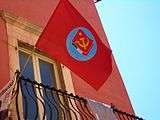
Later in 2006 the PdCI proposed to the PRC, the Federation of the Greens and other left-wing forces (among them the recently founded Democratic Left) the formation of a "United Left", "a left without adjectives". On 8–9 December 2007 the PdCI participated in the foundation of The Left – The Rainbow. In the 2008 general election the Rainbow list obtained 3.1% of the vote, failing to win any seats in the Italian Parliament and, consequently, it was disbanded soon after.
Out of Parliament
In July 2008 Diliberto was re-elected secretary during a national congress, during which he declared as "ended" the experience of a "united left" and proposed to the PRC a re-unification of the two parties and a "communist constituent assembly".[4]
For the 2009 European Parliament election, the PdCI formed a joint list known as Anticapitalist and Communist List with the PRC, Socialism 2000. United Consumers Originally Critical Left was also set to join, but finally chose not to.[5] The list received 3.4% of the national vote and failed to return any MEPs.
Soon after the election, Marco Rizzo, a leading member of the party, was expelled from the party after disagreements with Diliberto and launched a new grouping called Communists – Popular Left.[6]
Federation of the Left
In December 2009 the Anticapitalist and Communist List was transformed into the Federation of the Left (FdS).[7][8] The FdS held its first congress on 20–21 November 2010. Diliberto was elected spokesperson of the group by the national council.[9][10]
In the 2013 general election the PdCI was part of the Civil Revolution coalition, which obtained 2.2% of the vote and no seats.[2][11]
In July 2013 Diliberto stepped down from secretary after 13 years and was replaced by Cesare Procaccini, a 65-year-old former metalworker from Marche.[1]
The PdCI did not contest the 2014 European Parliament election, withdrawing its early support for The Other Europe electoral list.
Communist Party of Italy
In December 2014 the party was transformed into Communist Party of Italy, taking the name of the late Communist Party of Italy.[12]
Election results
Italian Parliament
| Chamber of Deputies | |||||
| Election year | # of overall votes |
% of overall vote |
# of overall seats won |
+/– | Leader |
|---|---|---|---|---|---|
| 2001 | 620,859 | 1.7 | 0 / 630 |
|
Oliviero Diliberto |
| 2006 | 884,127 | 2.3 | 16 / 630 |
|
Oliviero Diliberto |
| 2008 | with SA | |
0 / 630 |
|
Oliviero Diliberto |
| 2013 | with Civil Revolution | |
0 / 630 |
|
|
| Senate of the Republic | |||||
| Election year | # of overall votes |
% of overall vote |
# of overall seats won |
+/– | Leader |
|---|---|---|---|---|---|
| 2001 | with The Olive Tree | |
2 / 315 |
|
Oliviero Diliberto |
| 2006 | with The Union | |
5 / 315 |
|
Oliviero Diliberto |
| 2008 | with SA | |
0 / 315 |
|
Oliviero Diliberto |
| 2013 | with Civil Revolution | |
0 / 315 |
|
|
European Parliament
| European Parliament | |||||
| Election year | # of overall votes |
% of overall vote |
# of overall seats won |
+/– | Leader |
|---|---|---|---|---|---|
| 1999 | 622,261 (#12) | 2.0 | 2 / 87 |
|
Oliviero Diliberto |
| 2004 | 787,613 (#8) | 2.4 | 2 / 78 |
|
Oliviero Diliberto |
| 2009 | 1,038,247° (#6) | 3.4 | 0 / 72 |
|
Oliviero Diliberto |
| 2014 | did not run | |
0 / 73 |
|
Cesare Procaccini |
°The PdCI was part of Anticapitalist and Communist List.
Symbols
-
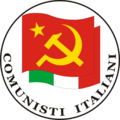
1998
-
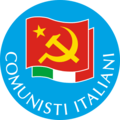
1999-2001
-
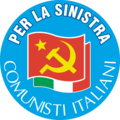
2001-2006
-

2006
Leadership
- Secretary: Armando Cossutta (1998–2000), Oliviero Diliberto (2000–2013), Cesare Procaccini (2013–2014)
- Coordinator: Marco Rizzo (1998–2009), Orazio Licandro (2009–2013), Alessandro Pignatiello (2013–2014)
- President: Armando Cossutta (2000–2006), Antonino Cuffaro (2007–2013), Manuela Palermi (2013–2014)
- Honorary President: Antonino Cuffaro (2013–2014)
- Party Leader in the Chamber of Deputies: Oliviero Diliberto (1998), Tullio Grimaldi (1998–2001), Marco Rizzo (2001–2004), Pino Sgobio (2004–2008)
- Party Leader in the Senate: Luigi Marino (1998–2006), Manuela Palermi (leader of the PdCI-Green's group, 2006–2008)
- Party Leader in the European Parliament: Lucio Manisco (1998–2004), Marco Rizzo (2004–2009)
References
- 1 2 Pdci, eletto nuovo segretario - Politica - ANSA.it
- 1 2 3 Tom Lansford (8 April 2014). Political Handbook of the World 2014. SAGE Publications. p. 712. ISBN 978-1-4833-3327-4.
- ↑ Tom Lansford (15 April 2013). Political Handbook of the World 2013. SAGE Publications. p. 715. ISBN 978-1-4522-5825-6.
- ↑ RaiNews24 - Diliberto rieletto segretario del Pdci, contro la minoranza: non rispettato il pluralismo
- ↑ Pdci e Prc, lista unitaria il 6 giugno "Anticapitalisti, con la sinistra europea" - Politica - Repubblica.it
- ↑ Lite con Diliberto, Rizzo fuori dal Pdci: «Sono capro espiatorio per le sconfitte» - Il Messaggero
- ↑ Per un nuovo inizio: costruiamo insieme la federazione della sinistra di alternativa | RadioRadicale.it
- ↑ Al via la nuova Federazione della sinistra
- ↑ Comunisti riuniti - Affaritaliani.it
- ↑ federazionedellasinistra.com - federazionedellasinistra Resources and Information. This website is for sale!
- ↑ Elezioni 2014
- ↑ http://www.repubblica.it/politica/2014/12/11/news/ritorna_il_partito_comunista_d_italia_il_pdci_si_riprende_la_denominazione_del_1921-102645066/
External links
![]() Media related to Partito dei Comunisti Italiani at Wikimedia Commons
Media related to Partito dei Comunisti Italiani at Wikimedia Commons